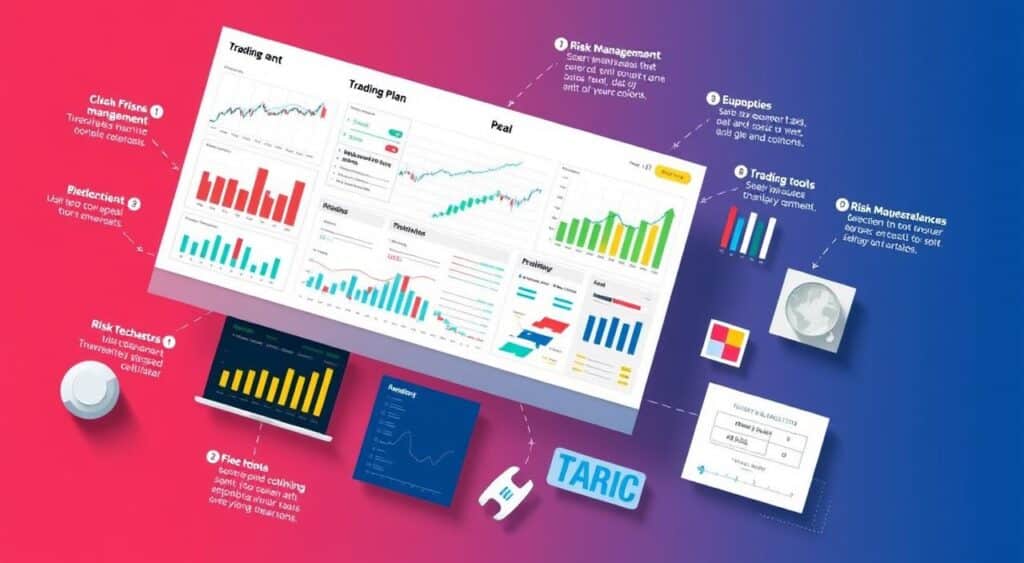In today’s digital world, online trading is a great way to make extra money. It uses the internet and financial markets to help investors earn more. This article will guide you through online trading, covering day trading, tips for beginners, and more.
It will also talk about choosing the right platform, popular strategies, and managing risks. Understanding these topics can help you succeed in online trading.
Key Takeaways
- Online trading offers individuals the opportunity to earn money by actively participating in financial markets.
- Understanding key concepts like day trading, liquidity, volatility, and volume is crucial for successful online trading.
- Choosing the right trading platform with features like real-time quotes, charting tools, and complex order options can enhance trading performance.
- Incorporating popular online trading strategies, such as long call and covered call, can help traders generate potential income.
- Effective risk management, including setting appropriate trade sizes and avoiding high-risk instruments like penny stocks, is essential for long-term success in online trading.
Understanding Day Trading
Day trading is a quick way to make money by buying and selling financial items like stocks and currencies in one day. It’s about making the most of small price changes. To do well, you need to know the market, use technical analysis, and manage risks carefully.
What is Day Trading?
Day trading means buying and selling financial items in the same day. It’s about making money from small price changes. You need to watch the market closely, make fast decisions, and trade a lot during the day.
Key Steps to Start Day Trading
- Develop a comprehensive trading plan: Outline your investment objectives, risk tolerance, and trading strategies.
- Choose a reliable online trading platform: Select a broker that offers a user-friendly interface, real-time market data, and a wide range of trading tools.
- Learn technical analysis: Familiarize yourself with chart patterns, indicators, and other technical analysis techniques to identify potential trading opportunities.
- Start with a small trading account: Begin with a modest account balance to minimize risk and gain experience before scaling up your trading activities.
- Practice with a paper trading account: Use a simulated trading environment to test your strategies and refine your decision-making process without risking real capital.
- Maintain strict discipline: Adhere to your trading plan, manage your risk effectively, and avoid emotional decision-making during volatile market conditions.
| Characteristic | Description |
|---|---|
| Trading Frequency | Day traders may make 100 to a few hundred trades in a day, capitalizing on short-term price movements. |
| Asset Classes | Day traders can focus on a wide range of financial instruments, including stocks, bonds, options, futures, commodities, and currencies. |
| Ideal Stock Characteristics | Good trading volume, moderate volatility, familiarity, and newsworthiness are desirable traits for day trading stocks. |
| Best Trading Hours | The most active and volatile trading periods are typically from 9:30 a.m. to noon ET and in the last hour of the trading day before the market close at 4 p.m. ET. |
By understanding day trading and following a structured approach, you can explore this fast-paced strategy. It might help you make profits in the financial markets.
10 Day Trading Tips for Beginners

Day trading can be very profitable but also risky. To do well, beginners should follow these key tips:
- Keep learning about the markets. Stay current with economic news and trading strategies.
- Use the right amount of money for trading. Don’t risk more than 1-2% of your total money per trade.
- Give the markets enough time. Day trading needs you to watch and act quickly during trading hours.
- Begin with a few stocks. Learn to trade a few well before you add more.
- Avoid penny stocks. They are too risky for new traders.
- Choose the right time for trades. Use price changes in the first and last hours of the day.
- Use limit orders to set prices. This helps you avoid making quick, emotional decisions.
- Have realistic goals. Good traders win only 50-60% of the time.
- Think about your trading often. Change your plans as needed.
- Stick to your trading plan. Don’t let emotions ruin your success.
By following these tips, new day traders can do better in the markets. They can make more money over time.
| Trading Tip | Benefit |
|---|---|
| Keep learning about the markets | Make smart trading choices |
| Use the right amount of money for trading | Manage risk well |
| Give the markets enough time | Watch and act on market changes |
| Begin with a few stocks | Master a few before adding more |
| Avoid penny stocks | Reduce risk of big losses |
| Choose the right time for trades | Use price changes in best hours |
| Use limit orders | Set prices to avoid quick decisions |
| Have realistic goals | Understand winning only 50-60% of the time |
| Think about your trading often | Keep improving your strategies |
| Stick to your trading plan | Avoid emotional decisions that harm success |
By following these tips, new traders can feel more confident. They can make more money over time.
“Successful day trading is not about making quick money, but rather about developing a disciplined approach and continuously improving your strategies.”
Choosing the Right Trading Platform

Choosing the right trading platform is key for online trading success. Look for important features that can greatly affect your trading experience and results.
Features to Look for in a Trading Platform
To pick the best online trading platform, focus on these essential features:
- Low Transaction Fees: Choose a platform with low fees for stocks, ETFs, and options to save on costs.
- Fast Order Execution: Ensure your trades are executed quickly to avoid price slippage.
- Comprehensive Market Data and Analysis Tools: Get real-time market data and advanced tools to guide your trading.
- User-Friendly Design: Opt for a platform that’s easy to use and navigate for a better trading experience.
- Reliable Platform Stability: Pick a platform known for reliability and minimal downtime to keep your trading smooth.
Top platforms for day traders include Interactive Brokers and Webull. They offer these key features and more to support your trading strategies.
“Choosing the right trading platform can make all the difference in the success of your online trading endeavors. Carefully evaluate the features that matter most to you to find the best fit for your investment goals and trading style.”
Online Trading Strategies

Online trading platforms give investors many ways to make money. Two key strategies are the Long Call and Covered Call methods.
Long Call Strategy
The Long Call strategy involves buying a call option. This option lets the trader buy the stock at a set price later. It’s a way to make money if the stock price goes up.
For example, a trader might spend $100 on a call option. If the stock price goes up, they can buy it at the lower price. This can make their initial investment grow a lot.
Covered Call Strategy
The Covered Call strategy is also popular. It involves selling a call option on a stock you own. This way, you get money from the option sale.
This strategy lets you earn money from the option sale. You still have a chance to make more money from the stock, up to the option’s strike price. For example, selling a call option might earn you $100. This can limit your gains but also gives you income and reduces risk.
These are just a few strategies available to investors. It’s important to know the risks and benefits of each before using them.
Risk Management in Online Trading

Online trading needs a solid risk management plan. Traders must know their risk limits, spread out their investments, and use strategies to cut losses. A good trading plan helps traders deal with market ups and downs and manage risks.
Using stop-loss orders is key in risk management. These orders close a trade when it hits a set price, preventing big losses. Traders also use technical tools like moving averages and support levels to set stop-loss and profit targets.
Diversifying investments is vital. By spreading investments across different sectors and regions, traders lower their risk. This makes their portfolio more stable and less affected by market swings.
| Risk Management Strategies | Potential Benefits |
|---|---|
| Stop-Loss Orders | Limit potential losses, maintain trading discipline |
| Portfolio Diversification | Reduce exposure to individual asset risks, enhance stability |
| Leverage Management | Avoid over-leveraging, maintain financial stability |
| Trade Size Allocation | Limit risk per trade, ensure affordability of losses |
| Hedging Strategies | Protect against adverse market movements, manage downside risk |
Using financial instruments wisely is important. Traders should think about their leverage carefully. Too much leverage can lead to big losses if the market moves against them.
By using these risk management strategies, online traders can improve their chances of success. They can handle the risks of the financial markets better and trade with more confidence.
“Successful trading is not about making a series of correct predictions, but rather about carefully managing risk and limiting losses.”
Online Trading

Popular Financial Instruments for Online Trading
Online trading lets investors explore many financial tools. Each tool has its own traits and risks. You can trade stocks, ETFs, options, and even foreign exchange (forex). This variety meets different strategies and risk levels.
Stocks are a big deal in online trading. You can buy and sell shares to make money from price changes and dividends. ETFs, meanwhile, let you invest in many stocks at once with just one trade.
Options trading is also popular. It lets you bet on where stocks or ETFs will go. You can buy or sell call or put options, making money in both up and down markets.
For global market fans, forex trading is available online. You can trade currency pairs to make money from rate changes. But, forex trading is risky, with big swings in value and leverage that can increase losses.
To do well in online trading, you need to know your stuff. Understand the asset’s features, risks, and how to trade it. Always research and think about each option before adding it to your trading plan.
“Online trading has democratized the financial markets, providing individual investors with unprecedented access to a wide range of investment opportunities.”
The online trading world keeps growing, offering more tools for investors. This lets you build a strong portfolio and reach your financial goals. Online trading platforms empower you to manage your wealth and achieve your financial dreams.
Developing a Trading Plan

Making a detailed trading plan is key for online traders aiming for steady success. A good plan has several important parts. These parts help a trader make smart choices.
Elements of a Successful Trading Plan
A good trading plan should have a few main parts:
- Clearly defined investment objectives: Traders need to set clear goals. This could be making steady money, growing wealth over time, or reaching a certain return on investment.
- Risk tolerance assessment: Knowing how much risk you can handle is vital. It helps choose the right trades and how much to invest in each one.
- Entry and exit strategies: Traders should know when and how to start and stop trades. This is based on market analysis and understanding the trade.
- Position sizing and portfolio management: Managing how much to invest in each trade and spreading investments is crucial. It helps keep risks low and capital safe.
- Disciplined execution: Sticking to the plan is essential. It helps avoid making quick, emotional decisions.
It’s important to check and update the trading plan often. This helps traders adjust their strategies to fit changing market conditions and financial goals.
Also Read: How To Earn Money With Cryptocurrency Investments In 2024
“Successful trading needs market knowledge, risk control, and emotional control. A solid trading plan is the base for traders to achieve long-term success.”
Trading plans can differ based on a trader’s style and what they like to trade. But, the basics of setting goals, managing risks, and sticking to the plan are the same. They are key for online traders to succeed in the fast-changing financial markets.
| Element | Description |
|---|---|
| Investment Objectives | Clearly define your financial goals, such as generating consistent income, building long-term wealth, or achieving a target rate of return. |
| Risk Tolerance | Determine your willingness to accept risk, which will guide the selection of appropriate trading instruments and position sizing. |
| Entry and Exit Strategies | Establish clear rules for when and how to enter and exit trades, based on technical and fundamental analysis. |
| Position Sizing and Portfolio Management | Implement prudent position sizing and diversification to manage risk and preserve capital. |
| Disciplined Execution | Adhere to the trading plan with discipline and emotional control to avoid impulsive decision-making. |
Conclusion
In this guide, we’ve looked into the world of online trading. We’ve talked about how to start and the strategies to use. We’ve given you lots of information to help you succeed as an investor.
Whether you’re new or have experience, managing risk, diversifying, and having a solid plan are key. Online trading platforms and staying up-to-date with market trends can help you grow your wealth.
Trading comes with risks, and it’s important to know the potential gains and losses. Always get advice from financial experts. Use educational tools and think about your goals and how much risk you can take when making your trading plans.
FAQs
Q: What is the best online broker for stock trading?
A: The best online broker for stock trading often depends on individual needs, but Charles Schwab is frequently recommended due to its powerful trading platform, 0 commission on trades, and comprehensive brokerage services.
Q: How do I open an account with an online brokerage?
A: To open an account with an online brokerage like Charles Schwab, you typically need to provide personal information, financial details, and choose the type of account you want, such as a self-directed brokerage account.
Q: What are the fees associated with trading stocks online?
A: Many online brokerages, including Charles Schwab, offer 0 commission on stock trades, but fees may apply for certain services, such as margin trading or mutual funds. It’s important to review all fee structures before selecting a broker.
Q: How can I contact my online broker for support?
A: You can contact your online broker, such as Charles Schwab, through their mobile app or website, where you can find customer service options or frequently asked questions for assistance.
Q: What trading strategies are effective for an investor?
A: Effective trading strategies for an investor may include day trading, swing trading, or long-term investing in stocks and ETFs. Each strategy involves risk and should align with your financial goals and market understanding.
Q: What is a brokerage account and why do I need one?
A: A brokerage account is an investment account that allows you to buy and sell various investment products, such as stocks and ETFs. You need one to engage in trading and manage your investment portfolio effectively.
Q: What is the role of an advisor in wealth management?
A: An advisor in wealth management helps investors create and manage their investment strategies, providing personalized advice based on financial goals. They can also help determine the best online broker and trading products for your needs.
Q: Are trading services subject to market volatility?
A: Yes, trading services are subject to market volatility, which can affect the prices of stocks and ETFs. It’s important for investors to be aware of this risk when engaging in online trading.
Q: What types of investment products can I trade online?
A: You can trade a variety of investment products online, including stocks, ETFs, mutual funds, and options. Each product comes with its own risk profile and potential for returns.
Q: Can I trade stocks online using a mobile app?
A: Yes, many online brokerages, including Charles Schwab, offer a mobile app that allows you to trade stocks online, monitor your portfolio, and access trading services conveniently from your smartphone.
